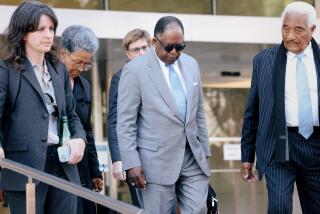Jurist known as ‘tough’; that’s why Bush selected him
- Share via
WASHINGTON — Years ago, when he was a local trial judge, Reggie B. Walton developed a reputation for his sentencing of ordinary street thugs.
“If you got convicted, he was going to smack you,” said Randall Eliason, a former prosecutor who recalled that Walton would often sentence defendants more harshly than other judges would.
For the record:
12:00 a.m. June 8, 2007 For The Record
Los Angeles Times Friday June 08, 2007 Home Edition Main News Part A Page 2 National Desk 1 inches; 53 words Type of Material: Correction
Libby trial: An article Thursday in Section A about U.S. District Judge Reggie B. Walton’s sentencing of I. Lewis “Scooter” Libby said Martha Stewart, who was convicted of lying to securities regulators, eventually dropped her appeal and reported to prison. While in prison, she continued to pursue her appeal, which she eventually lost.
On Tuesday, Walton extended a measure of his justice to a more prominent defendant: former vice presidential aide I. Lewis “Scooter” Libby.
Rejecting pleas for leniency from scores of prominent public officials, Walton sentenced Libby to 2 1/2 years. On top of the stiff sentence, the judge indicated that he was inclined to order Libby to begin serving the sentence immediately, even before his lawyers have appealed his case. The outcome stunned supporters of the amiable, career public servant and stirred talk of a presidential pardon.
That Walton would put the Bush administration in an uncomfortable position of having to consider a politically charged pardon for Libby is highly ironic: The 58-year-old jurist was one of the first appointments that Bush made to the federal bench in October 2001, a prime example of a new law-and-order mentality that the administration wanted to infuse in the courts.
“Bush wanted people to know that ‘I appoint tough guys to the bench,’ ” said Roscoe Howard, the U.S. attorney in Washington during Bush’s first term. “They appointed him just for what he did to Scooter; they were just not expecting it to happen to Scooter.”
By all accounts, Walton is a tough guy. A judge for more than 25 years, he did two separate stints on the Superior Court of the District of Columbia, appointed by both Presidents Reagan and George H.W. Bush. He served as an associate director of the White House drug control office and as chairman of a national commission to curb prison rape.
The Washington Post reported an incident two years ago in which Walton, driving his family in downtown Washington to the airport for a vacation, noticed a cabdriver being attacked. The 5-foot-9 judge, who played football at West Virginia State University, stopped his vehicle, wrestled the attacker to the ground and held him in check until police arrived.
“He started toward me,” Walton told the Washington Post. “I had to take him down.”
Despite Walton’s history as a “long ball hitter” when it comes to sending criminals to jail, lawyers and legal experts said the punishment he imposed on Libby was within his discretion under the law.
The 2 1/2 year sentence was within the range of guidelines that the Bush administration has created and espoused for federal judges to follow to ensure that defendants are punished the same regardless of the judge hearing their case. The administration and Republican members of Congress have admonished other judges who give defendants a break under the guidelines -- as lawyers for Libby sought Tuesday when they asked Walton to give him probation only.
Walton also indicated at the sentencing hearing that he was inclined to not allow Libby to remain free while he appeals his conviction. His supporters say that is fundamentally unfair and an unnecessary indignity for someone who has had a long career in public service.
Legal experts said the bail decision was a closer call.
Many white-collar defendants -- such as lifestyle maven Martha Stewart -- have been allowed by courts to stay out of prison while they pursued their appeals. Stewart was convicted of lying to securities regulators and eventually dropped her appeal and reported to prison. Former Bush administration procurement official David H. Safavian remains free while he appeals his June 2006 conviction for lying and concealing his dealings with disgraced Republican lobbyist Jack Abramoff.
Historically, judges have tended to go easy on nonviolent criminals because they are not likely to flee or pose a threat to society. There was also a view that their crimes were somehow less serious than violent assaults and the like.
But there is also long-established law requiring defendants to serve their sentences immediately unless there is a good chance that their convictions will be overturned on appeal. More and more judges are starting to hew to a stricter standard.
“There is more of an acceptance by judges that white-collar crimes are really not distinguishable from any other type of crime,” said John Hueston, a Los Angeles lawyer. “There is no longer an assumption, unstated in the law, that white-collar criminals should be treated differently than others, especially when pending appeal.”
As a federal prosecutor, Hueston helped convict former Enron Corp. Chief Executive Jeffrey K. Skilling last year in a Houston courtroom; Skilling was eventually denied bail and sent to prison. In another case, a New York state judge refused bail for Tyco International Ltd. executive L. Dennis Kozlowski, sending the once high-flying tycoon from the Manhattan courtroom in handcuffs after sentencing in 2005.
Walton has already told defense lawyers in the Libby case that he sees little chance that they will succeed with their appeal. But he has allowed them to file additional papers to try to change his mind. The judge has set a hearing for June 14 in which he will probably decide Libby’s fate.
Depending on how Walton rules, Libby could have to surrender to authorities in a few weeks. In that event, his lawyers would probably appeal to a higher court and ask for a stay.
Eliason sees a measure of justice in that result.
“What Judge Walton is doing is the right thing and what the law requires. If he does not think there is a substantial issue on appeal, then Libby should start doing his sentence,” Eliason said. “He is applying the same standard to a white-collar crime defendant as he would to a drug defendant. He is not giving him any special treatment.”
--
More to Read
Sign up for Essential California
The most important California stories and recommendations in your inbox every morning.
You may occasionally receive promotional content from the Los Angeles Times.













